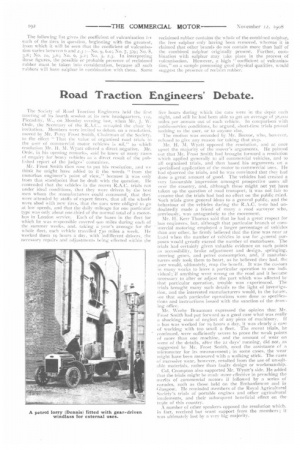Road Traction Engineers Debate.
Page 6

If you've noticed an error in this article please click here to report it so we can fix it.
The Society of Road Tractioa Engineers held the lirst meeting of its fourth session at its new headquarters, 112, PICCaCilliy, W., on Monday evening fast, when Mr. J. W. Orde, the Secretary of the R.A.C., occupied the chair by invitation. lembers were invited to debate on a resolution, moved by 1d r. Percy Frost Smith, Chairman of the Society, to the effect " That the value of organised road trials to the user of commercial motor vehicles is nil," CO which resolution Mr, 11. M. Wyatt offered a direct negative. Mr. Orde, in his openingremarks, said he knew of many cases of enquiry for heavy vehicles as a direct result of the published report of the judges' committee, Mr. Frost Smith then rose to put his resolution, and we think he might have added to it the words " from the motorbus engineer's point of view," because it was only from that standpoint that he dealt with the question. l le contended that the vehicles in the recent R.A.C. trials ran under ideal conditions, that they were driven by the best men whom the manufacturers could conunand, that they were attended by staffs of expert fitters, that all the wheels were shod with new tires, that the ears were obliged to go at low speeds, and that the daily mileage for one particular type was only about one-third of the normal total of a motorbus in London service. Each of the buses in the fleet for which he was responsible covered 900 miles during each of the summer weeks, and, taking a year's average for the whOle fleet, each vehicle travelled 730 miles a week. He worked them oa hours a day, with indifferent drivers, the necessary repairs and adjustments being effected within the live hours during which the cars were in the depot each night, and still he had been able to get an average of :-..;,coo mdes per afInt1111 out of each vehicle. In comparison Nyith public-service conditions, he argued, short-lime trials proved nothing to the user, or to anyone else,
The ITIOti011 WaS seconded by Mr. Beevor, who, however, refused to give any reason for taking that step,
Mr. H. M. Wyatt opposed the resolution, and at once upset the majority of the clover's arguments. He pointed oat that Mr. Frost Smith had brought forward a resolution which applied generally to all commercial vehicles, and to all organised trials, and then based his arguments on a speciaIis-ed application of the motor to commercial uses. He had observed. the trials, and he was convinced that they had done a great amount of good. The vehicles had created a very favourable impression amongst prospective users all over the country, and, although these might not yet have taken up the question of road transport, it was not fair to assume that the trials had had no effect on the public mind. Such trials gave general ideas to a general public, and the behaviour of tile vehicles clurin.g the R.A.C. tests had undoubtedly made a friend of malty a road surveyor who, previously, was antagonistic to the movement. Mr. H. Kerr Thomas said that he had a great respect for .bus engineers. but, although that particular branch of commercial motoring employed a larger percentage of vehicles. than any other, he firmly believed that the time was near at head when the number of vehicles in use for general put-poses would greatly exceed the number of motorbuses. The trials had certainly given valuable evidence on such points. as accessibility, brake adjustment and design, springing, steering gears, and petrol consumption, and, if manufacturers only took them to heart, as he believed they had, the user would, ultimately, reap the benefit. It was the custom in many works to leave a particular operation to one individual; if anything went wrong on the road and it became necessary to alter or adjust the part which was affected by that particular operation, trouble was experienced. The trials broi4,k-ht many such details to the light of inyestigalion, and the interested manufacturers would, in the future, see that such particular operations were done to specifications and instructions issued with the sanction of the drawing office. Mr. Worhy Beaumont expressed the opinion that Mr. Frost Smith had put forward as a good case what was really a shocking state of neglect of any piece of machinery. If a bus was worked for to hours a day, it was clearly a case of working with too small a fleet. The recent trials, he continued, were sufficiently severe to prove the weak points of mare than one machine, and the amount of wear on some of the details, after the 22 days' running, did not, as saggested by Mr. Frost Smith, need the assistance of a micrometer for its measmement; in some cases, the wear might have been measured with a walking stick. The rases of excessive wear, however, resulted from the use of unsuitable materials, rather than faulty design or workmanship. Col, Crompton also supported Mr. Wyatt's side, He added that the trials might he made more effective in preaching the rceeits of commercial motors if followed by a series of carades, such as those held On the Embankment and in dasgow. He reminded members of the Royal Agricultural Society's trials of portable engines and other agricultural implements, and their subsequent beneficial effect on the. trade of this country.
A number of other speakers opposed the resolution which, in het, received but scant support from the members; it was ultimately lost by a very big majority.






















